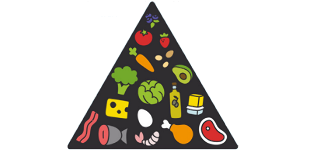“The ketone diet burns fat, but still maintains a very good caloric intake, allowing you to preserve muscle mass and a good metabolic rate. It is no wonder that more and more people are choosing the ketone diet. These are not just the principles of nutrition, this is a biohacking tool ”- these words can be read today on social networks of supporters of the keto diet. It's really? Let's examine this question objectively and weigh the pros and cons
The essence of the ketogenic diet is to exclude carbohydrates as much as possible (and this is not just about baked goods, pasta, sugar and their substitutes, but also honey, fruits, roots, cereals and rice in any form). The diet allows for a 5% carbohydrate quota due to berries, herbs and some vegetables.
For comparison: in the standard food pyramid, regulated by the World Health Organization as the basis for a balanced diet, the proportion of carbohydrates can reach 60%.
As you know, it is not safe to practice a protein diet, but where do you get your energy from? The answer lies in fats. You shouldn't be afraid of them; The horrors of cholesterol, which scared people throughout the 20th century, in the 21st are seen as intrigues by interested pharmaceutical companies. It is important to make a correction: we are talking about the right fats, rich in polyunsaturated fatty acids, and not juicy kebabs, margarines and trans fats, which are harmful to health.
WHAT IS KETOSIS? HOW DOES THE KETO DIET WORK?
Principle of the diet
The body uses carbohydrates as the main "fuel" for the brain. With a marked reduction in carbohydrates in the diet below 20 grams per day, the amount of glucose is critically reduced - and there is not enough energy for normal functioning and oxidation of fats. To nourish the brain, the body begins the process of obtaining alternative energy - ketosis. This is a condition that develops as a result of starvation of carbohydrate cells, when the body begins to break down fat for energy to form a large number of ketone bodies. In the normal state, the concentration of ketone bodies in the blood is very low, as they are replaced by glucose and the body does not need additional energy. During ketosis, the concentration of ketone bodies increases dramatically.
Ketosis can also be achieved by fasting for several days, but this is extremely harmful. The ketone diet is an alternative to a complete fast that can cause less damage to the body. Along with food, we continue to receive all the necessary substances and do not feel hungry, excluding only carbohydrates and forcing the body to start the process of decomposing fats.
The ketone diet has a very solid scientific basis; it showed excellent results in children and adults with epilepsy - until the disappearance of the seizure syndrome in the context of withdrawal of anticonvulsants. It is effective for people with certain autoimmune diseases and Alzheimer's disease, as well as for people with cancer. The fact is that the tumor cells "feed" on glucose and, according to studies, the switch to a low-carb but high-fat diet leads to regression of the tumor process.
Observations from patients who adhered to this nutritional model showed that, strangely, a person begins to feel a surge of energy, brain activity increases and mood improves. The secret lies in biochemical processes: the body changes to new sources of energy - ketones, formed during the breakdown of fat.
The first promoters of the ketone diet were biohackers who wanted to live healthy and active until old age.
Hollywood stars joined them, and then the ketone diet craze swept the world. Removing excess fat by consuming fats can simply be a challenge.
However, only an experienced nutritionist should prescribe the ketone diet. He is not a diet consultant, he is not an Insta food blogger, he is not a nutritionist or a ketoadept. There are certain contraindications for this food system, for example, diabetes, chronic pancreatitis, cholecystitis, familial hyperlipidemia and so on. Furthermore, at the beginning of the diet, when switching to other energy sources, complex body adaptation is common.
KETO DIET FOOD PYRAMID

The main cons of the ketone diet:
- This is an unbalanced diet. When you completely eliminate carbohydrates, you lose a large number of nutrients to the body.
- A tendency to constipation may occur. For the organs of the gastrointestinal tract, such a diet is not at all helpful.
- Odor of acetone in the body, urine and mouth can occur. To minimize the odor, you should drink more than 2 liters of water a day so that the acetone is removed more actively.
- All carbohydrates are excluded, a process that is generally not as active is triggered artificially, the load on the liver is increased. This is very harmful to health.
Main benefits of the keto diet:
- Rapid weight loss. The exclusion of carbohydrates from the diet does not allow the body to use substances as usual: to store fats "in reserve" and to use carbohydrates as the main energy.
- There is no constant feeling of hunger as with other diets. This means that there is no sudden jump in blood sugar (the role of glucose is played by ketone bodies).
- Foods with a high calorie content satisfy and help prevent breakage.
- Fats are burned in the body and muscle mass is preserved.
For whom this type of diet is contraindicated:
- pregnant;
- people with diseases of the gastrointestinal tract;
- people with type 1 and type 2 diabetes mellitus;
- people with endocrine disorders;
- breastfeeding
Is it really possible to lose weight with a ketone diet?
The ketone diet promotes weight loss, energizes and allows the person to be satiated for longer. The secret to increasing satiety and energy levels is the fact that most calories enter the body with fats, which are very nutritious and slow to digest. As a result, people on a ketone diet consume less calories because they don't experience hunger attacks any longer. They no longer need to eat as much or as often.

Its main objective is to continuously maintain a person in a state of natural ketosis. It usually takes about four to eight weeks for a complete ketone adaptation. After that time, the level of glycogen (glucose stored in the muscles and liver) will decrease, excess water will be released from the body, muscle resistance will increase and the person will feel a powerful burst of energy. When you start eating low-carb foods in the ketogenic diet, you will need to monitor your ketosis. That way, you'll know exactly what you're doing right and what's wrong and whether you need to make any changes to your diet. The simplest test is the ketone breath test. After a few days, you will taste a fruity, slightly acidic or even metallic taste in your mouth. What is the reason? During ketosis, your body synthesizes ketone bodies: acetone, acetoacetate and beta-hydroxybutyrate. Acetone is excreted in the urine and in the breath, which is why "ketone breathing" appears. Usually, bad taste and bad breath subside after a few weeks.
Side effects of the diet
Reducing the proportion of carbohydrates causes a decrease in insulin levels in the blood, as a result, the kidneys receive a signal to release excess sodium. Between reducing sodium intake and eliminating excess sodium deposits, the body releases more sodium bicarbonate than normal, causing sodium and other electrolyte levels to drop. When this happens, you may experience fatigue, headache, cough, runny nose, irritability and nausea. This condition is called a ketoplash. It is important to understand that it was not caused by the flu virus. This cold is neither dangerous nor infectious. The name, in this case, reflects only the similarity of the symptoms. When signs of discomfort appear, many people are afraid, thinking that the ketone diet has negatively affected their health, and start eating carbohydrates again. In fact, the ketone cold is a sign that your body has finally eliminated sugar, carbohydrates and industrial foods and is rebuilding itself to use fats as an energy source. It usually only lasts a few days, this is the time it takes to adapt. You can alleviate the condition by including more sodium and electrolytes in the diet by drinking more water.
In any case, before dieting, you should consult your doctor and during this period monitor your condition: blood biochemistry, blood pressure, condition of the cardiovascular system and organs of the gastrointestinal tract.
It is important to emphasize the main thing: each person is different - with a special body structure, genetically inherited constitution, stress factors, level of physical activity and acquired eating habits, which have a tremendous impact on health.
Therefore, the ketogenic diet is a high fat and low carbohydrate diet plan, designed to put the body in a state called ketosis and burn stored fat. Designed for children with epilepsy, the celebrity ketone diet has exploded in popularity in recent years.
However, a year ago, most of the media questioned the benefits and even the safety of this method of weight correction. The ketogenic diet is not a magic bullet for losing weight. Avoiding carbohydrates leads to an unbalanced diet (you are depriving yourself of essential nutrients), headaches, weakness, chills. And the ketone diet can also cause a lipotoxic state and, as a result, cause inflammation of the liver, gallbladder and reach the stomach. In the long run, it may increase the risk of atherosclerosis and stroke by insulin.
Listen and study your body. And then you can, if you wish, quickly lose those extra pounds by choosing the best weight correction method for you.































































